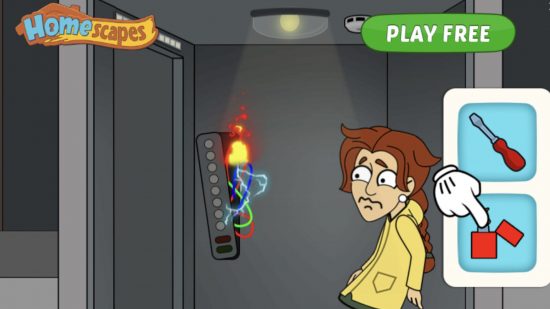You’re thinking it during the Merge Mansion trailer. You’re thinking it as you watch the ad with the pin-pulling and sand falling into the right space, something that has nothing to do with the game it’s promoting. You’re thinking it when in the thirty-second ad break of a game you’re forced to digest a convoluted narrative tenuously connected to a different match-three game. Why are mobile game advertisements getting so weird?
Hell, we’re all asking it, so today Pocket Tactics is here to answer that question, or at least put the same amount of effort into it as a sweet old lady setting up a murder mystery for her favourite granddaughter. To know what we’re looking at, though, we need to differentiate things first.
There are two types of weird mobile game ads in question here. The first is the most famous example, your Merge Mansions and the like, using short clips to introduce convoluted narratives at whiplash-inducing speed with no real connection to the gameplay in the title. Then there’s the second example, games that aren’t what they appear. In this instance, we’re talking about the falling sand or pin-pulling game examples you often see in in-game ads for titles like Evony or Hero Wars or when scrolling through the App Store and Google Play.
While both types of weird mobile game ads are guilty of the same crime – that being advertising content that doesn’t exist in-game or has a weak link to the game’s concepts and narrative – there is a myriad of reasons why the developers and publishers opt for this course of action. The most obvious is that these games get people talking, especially Merge Mansion, which can thank its advertising campaign rather than its simplistic match-three gameplay for its substantial following.

Still, the reason we have to separate Merge Mansion from other examples is that the game with the killer granny artfully steps around accusations of false advertising by using what we can call a metanarrative approach. Essentially, instead of the events of the story happening in-game, they mainly take place in the game’s commercials, teasing players that there might be more than meets the eye behind this story. If anything, there’s less than meets the eye.
Now, it might seem strange to think that Merge Mansion’s story is entirely outside of the game, but not if you consider the idea of ‘the hook’. What we mean by ‘the hook’ is what grabs you. It’s a concept from across all creative works, from pop songs to documentary series. Merge Mansion’s hook is massive, engaging, and mysterious. It gives you just enough to question what’s going on. It makes you want to find out more, so you download the game, and by the time you’re on your fifth level of match-three mundanity, you’ve almost forgotten about grandma and her nefarious schemes.
It’s for this reason that Merge Mansion doesn’t face the same sort of scrutiny as properly false adverts, such as those with no real connection to what they’re trying to get you to play. Rather than Merge Mansion and its few imitators, this type of advertising is all-over, often used by smaller studios who have less to lose from facing off against advertising standards. They’re not all small, though, and there’s one example that nearly brought the whole practice to its knees. Yes, we’re talking about Homescapes.
In 2020, the UK-based Advertising Standards Authority banned adverts for Playrix games Homescapes and Gardenscapes on the grounds of false advertising. In this instance, the legal argument is all about the concept of “core gameplay”. Before the case, Playrix had been using pin-puling puzzles – like the ones pictured below – to advertise its game which contained entirely different gameplay.
Since the ban, the pin-pulling adverts remain, but often for smaller games that feel they need to take the risk in opting for false advertising, or those who are happy to play the system until it catches up with them. As a UK-based writer, I still see these pin-pulling puzzles often during in-game ads, but find that the games these adverts link you to don’t contain the gameplay from the trailer.
Essentially, it’s all about getting users through the door. Developers and publishers concentrate on data, particularly the relationship between cost per install (CPI) and average revenue per user (ARPU). So, both the advert and the game have to be as engaging as possible. To try and maximise both numbers, the creators of these games use shady tactics like advertising entirely different core gameplay, as is the case for Homescapes. There are other examples too, from shoddy shooters using footage taken from different games to racy adverts full of scantily clad heroes who appear fully dressed – if at all – in the full game. “Or, my personal favourite, the Mafia City adverts. Unfortunately, the ASA only has so much time.
You can see the clear difference between the cheeky approach of Merge Mansion and that of Gardenscapes, Homescapes, and the countless imitation ads that you can still easily find today (though not from Playrix, at least). Still, the reason we’re writing this article is for, well, a reason as to why they’re doing this. That part is even more simple than figuring out what they’re doing. Simply put, it works.
According to SensorTower, Playrix has earned over a billion dollars from the lifetime achievements of its current portfolio, with Homescapes and Gardenscapes sitting comfortably at the top of the pile as the developer’s best performers. The two games combined have more than 500 million downloads, much of which you can attribute to the advertising campaigns rather than the absent originality of these match-three titles.
In the case of Merge Mansion, it’s not about creating a lie, but rather teasing a mystery and continuing to kick that can further down the road. From the first animated trailers to the most recent starring Pedro Pascal, there is seemingly a secret at the heart of Merge Mansion, but we’ll probably never find out the true story. Not only is this hook effective, but it’s a conversation starter, plus a goldmine for YouTube media theorists like MatPat and the like, creating a content bubble around the game.
It’s also about allusion for Merge Mansion, with the lead role of granny played by Kathy Bates in the live-action adverts. If you don’t know, Bates is an on-screen presence many of us relate to the horror genre, thanks to her work in Misery, American Horror Story, and beyond. Here, Merge Mansion is trying to convince you that something is going on under the hood. But it’s an illusion, Bates has no in-game role, and her presence is there to put you off the scent further.
It works for Merge Mansion, too. With millions of downloads since launching, Merge Mansion has effectively used the secondary content mill to help fuel interest in the game. There’s an interesting comparison to make between Five Nights at Freddy’s and Merge Mansion, with both games inspiring countless theories that further inspire players to dig through the depths of the game. The difference is that in FNAF there’s something to find.
Of course, we can’t get through this article without mentioning Lily’s Garden. Lily’s Garden is in a sense the original weird mobile game ad. You remember it, right? The pregnancy test? The breakup? All that drama. Well, of course, it had nothing to do with the game. Still, behind the creation of these ads, there’s a telltale story on why Lily’s Garden did what it did, and we can only assume it’s the same reason Merge Mansion is doing what it’s doing now.
In an interview with Intelligencer back in 2019, Lily Garden’s story lead Stella Sacco explains how the adverts came to be. It turns out Lily’s Garden’s viral clips were all outsourced, with no collaboration between the game’s story writer and those creating the concepts for the trailers. Offering a reason for the Danish developer Tactile Games chose that tactic, Sacco told the interviewer, “all of those are all totally fabricated for, I guess, virality.”
So, in looking for a metaphorical comparison to how games like Merge Mansion and Lily’s Garden find success, I’ve settled on the “throw enough shit” analogy. Mobile game developers are simply throwing shit at a wall and seeing what sticks. Apparently, granny-fuelled murder and breakneck pregnancy narratives do just that.
What we’re looking at here is an example of smart false advertising in Merge Mansion and an example of flagrant false advertising in Homescapes. Thanks to the ASA, mobile game ads like that of Homescapes and Gardenscapes no longer have a place in the UK, as other standards agencies have been less quick to move, but Merge Mansion sidesteps the issue by at least linking the characters from the commercials and the gameplay. Sure, they don’t do the same thing, but who can remember that when you’re five levels deep into what’s looking like a match-three-heavy afternoon?
So, in answer to our original question – why are mobile game adverts so weird? – it’s because it works. Merge Mansion learned from the mistakes of Homescapes, so instead of promising a game that isn’t there, promise a story you never experience except through continued commercials. In that way, the developer can avoid the standards agencies while picking up free promotion from the befuddled users and ad viewers wondering exactly what is up with granny.
With all this in mind, don’t expect to see the weirdness of Merge Mansion disappear anytime soon. If anything, you can probably expect more to come. Metacore Games, the developer behind the mysterious match-three gameplay in Merge Mansion, has seen stellar profits from those who come in the door looking for murder and leave having spent a solid sum on extra match-three lives. So long as granny keeps popping up on your timeline, you can expect those profits to keep pouring in and the theories to keep pouring out.
For deep dives into the mobile gaming industry, check out our features on forced change in microtransactions and a Samsung interview touching on the future of the brand’s devices.




